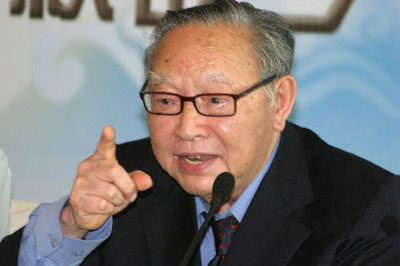|
 |
|
File photo of Leung Yue-Sang (Cnsphoto) |
Writer Leung Yue-Sang was buried in Macquarie Park Cemetery in northern Sydney on January 31, 2009.
A low-profile Christian funeral was held for the late novelist with only family members and close friends in presence on Saturday morning. The proceedings were conducted by a Chinese priest.
Another renowned Chinese martial arts writer Jin Yong sent a condolence wreath to the funeral home and expressed his feeling of inferiority to the late master.
The Australian edition of the Hong Kong newspaper Sing Tao Daily reported last Monday, Leung Yue-Sang, a pioneer in Chinese martial arts novels, died on January 22 at his home in Sydney, Australia. He was 85.
Luo Fu, the former editor of the now-defunct Sin Wan Bao newspaper, which hired Leung to write his first kung fu series, was quoted by Hong Kong's Ming Pao Daily News on last Tuesday as saying that Liang had died.
Leung, whose real name was Chen Wentong, had been in poor health in recent years. He was diagnosed with bladder cancer in 2004 and suffered a stroke when he visited Hong Kong in 2007, Ming Pao said.
Born to a prominent family in China's southern Guangxi region on April 5, 1924, Leung was schooled in classical Chinese literature and Chinese history. He studied economics at Lingnan University in the southern Chinese city of Guangzhou and joined Sin Wan Bao newspaper as an editor after graduation.
His writing career started at Sin Wan Bao which asked him to pen a kung fu series in 1954, capitalizing on a martial arts fever in Hong Kong sparked by a public duel between two rival fighting styles. Leung went on to write 36 novels over a three-decade career before retiring in Sydney.
Leung's work reflected his knowledge of Chinese literature and history. He often opened his novels with a poem and included characters interested in literature. His plots combined historical events and fiction.
Some of Leung's novels were adapted for TV and film. Among the more famous movie adaptations were director Tsui Hark's Seven Swords (2005) and Ronny Yu's The Bride with White Hair (1993), which were big screen versions of Seven Swords of Mount Heaven and Romance of the White Haired Maiden.
(CRIENGLISH.com/Agencies February 1, 2009) | 